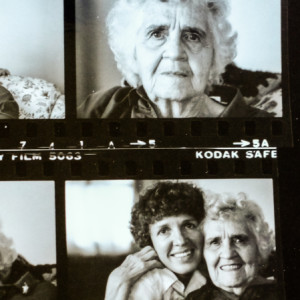Happy Birthday, Ouija
My maternal grandmother was born April 9, 1900 in High Point, North Carolina, so today I am celebrating her 120th birthday. Her name was Olive Kendall Dermid, though I always called her Ouija (pronounced WEE-gee), which is what my granddaddy called her. She was the youngest of seven children and the only girl, her mother’s delight and her father’s pride.
Because she was the much-pampered baby in a large family, she never learned to cook. When she married Johnny Dermid, a mountain boy from a hard-knock family, her lack of cooking skills made her a laughing stock. For years she burned meat and fish, stewed vegetables to a paste, and made a wet gom of potatoes or rice. She struggled mightily with yeasted breads, though she did finally conquer breakfast biscuits (similar to scones) and chocolate fudge. Whenever she was troubled or worried, she’d make up a pan of fudge and eat the whole thing herself.
She was light-hearted and kind, an expressive woman who cried as easily as she laughed and loved to dance a soft shoe around the house as she did her dusting. Large-bodied and graceful, she sang off-tune with enthusiasm and loved to tell stories: Bible stories, Irish legends, jokes, and stories about her favorite heroine, Eleanor Roosevelt. She’d confess, if anyone was listening, that she wasn’t much good at housekeeping; she’d rather go for a walk in fresh mountain air than anything else on earth, especially in spring and fall.
When the depression hit, she and Johnny decided she’d hand over their children to relatives in the daytime so she could earn enough money to keep them solvent, and she worked for many years in school lunch rooms (not cooking, but keeping books and supervising menus). Later in life she worked in a gift shop, and when I was in high school, as a clerk in an insurance agency, but she never had more than just enough money to get by, always had to be frugal, and never complained about that.
What was most important to her, aside from walks in mountain air, was her spiritual life. Every morning of her years on earth, she read the Bible and made what she called her “Morning Devotionals.” Daily, she reset her intention to be kind, patient, grateful for her blessings, and understanding of others, and I never saw her fail. Nor did I ever hear her gossip or say unkind words about another person. Well, there was one. Apparently my granddaddy had a fling with a woman she referred to as “the floozy,” but if that topic arose in conversation (and it seldom did) she abruptly changed the subject or flounced off in a huff. I never knew the floozy's name. Ouija went to church on Sundays, but she ignored the southern church’s prohibitions against card-playing, music, dancing, and race-mixing, and though she was entitled to membership in the United Daughters of the Confederacy, she said she couldn’t afford to pay the dues, and she often whispered to me, “I don’t see the point of all this Confederate business; I don’t see how a good Christian can support that. It was," she would raise her voice at this point, ”about slavery ! All that States Rights stuff is a whitewash." (I would have said hogwash, but she considered the word vulgar.)
Ouija never understood her daughter, who was mean-hearted as a yard dog and fierce as nails. When I was born, my mother gave me to Ouija and my granddaddy to raise, and they took me on with hardly a wince. Ouija was then 45, still working a half-time job, and she figured to raise me to adulthood. Granddaddy took me to work with him at the hardware store in the mornings, and at mid-day Ouija finished her work and collected me for the rest of the day and night. I was five when mother married and declared she was taking me. Ouija, Granddaddy, and I had no say in the matter, but I must have hollered and wept for months. Eleven years later, when I could stand the abuse no longer, Ouija took me back in. By then she was 62, living on a tiny salary from her desk job at the insurance agency and a minuscule widow’s pension. It was not easy to raise a teenager on that, but she agreed to it and actually seemed happy about it. Never once did she express regret for taking me, although it cannot have been easy, taking on a teenager recoiling from years of abuse and trauma. Whatever good there is in me, I owe to her and to my granddaddy, who died when I was ten.
I made these photos with my Pentax K1000 when I took Seth to see her for Christmas in 1979. We were living in New Orleans, where he was in first grade and I was cobbling a life together by working part-time for the public relations office of New Orleans Public Schools, writing poetry (for no money), acting (for no money), and doing some freelance photography (mostly for no money). I couldn’t afford to get any of the photographs printed, and sadly I lost the negatives years ago, so these contacts are all I have left of that photoshoot. If I had been able to print one, it would have been the one at lower right, as to my eyes it reveals her kindness and is also the only one well-focused. Extra: Seth at 6 made the one of me with her on that same day, after I set up the controls for him.


Comments
Sign in or get an account to comment.


